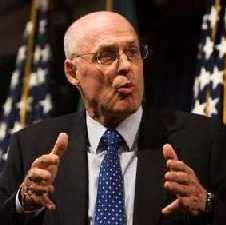So far the only skill Henry Paulson and his fellow Banker, Wall St., elites have demonstrated is their ability to completely dominate the clueless government of the USA; a government so dependent on criminal free marketeers that it continues to rob the public on their demand!

Star-spangled BULLSHIT!
We all know the expression ‘throwing good money after bad’ -- the most explicit example of that old adage is evident today on Wall Street; I have lost count of the number of FAILED ‘bailouts,’ notwithstanding the never ending demands put on the public purse by the rogues that created the problem in the first instance; kick me if I can’t add 2+2!
Financial cartels CONTINUE to devour the people’s hard-earned money but who is accepting responsibility for Banking failures and the continuing brazen robbery of the public purse? No one, not a soul! Paulson and his cohorts have shifted responsibility onto – and here’s the sting – the CLUELESS puppet government that is largely immune from the legal consequences of making bad decisions such as the irresponsible 'management' of public money! You could hardly blame a moron for being a moron especially when it was firmly established that the, ‘mission accomplished,’ President of the USA is a mindless moron! Notwithstanding others in high office were giving him a run for his ‘known unknown,’ ‘bouquet of flowers,’ money!
Puppet government, the perfect vehicle of rogues, as it presents a legitimate front and remains largely immune from numerous prosecutions that would otherwise affect the above-mentioned Financial racketeers who would be clearly liable for their scurrilous actions. These individuals would take a hammering under any REAL INVESTIGATION OR GOVERNMENT INQUIRY – but not a hint of a REAL investigation, I wonder why?
It is widely known that the private sector, over a few decades, besieged and took control of most ‘democratic’ governments around the world but most profoundly in the USA, where the marionette White House is something akin to Balinese shadow-puppet theatre!
In the absence of representative, democratic government -- the traditional means by which the people safeguard their interests and deliver justice -- the solution is clear. After herding these executives into Guantanamo-style detention and applying legal ‘waterboarding’ interrogation techniques, we would soon all learn exactly who is responsible for the current calamity and where all the good money has been stashed! George Bush made it all legal, dummies, so use the means at your disposal on those who deserve it most, you dumb fuck’s!
Failing the above alternative there is always the traditional law of the old West that Bush invoked in reference to Bin Laden -- who could only dream of wreaking the degree of damage on the nation that Bankers have to date – “wanted dead or alive,” just take ‘em out and shoot ‘em, ain’t that right, Jesse?
Are you doodle dandies able to think at all? It wasn’t too difficult arriving at the above REAL SOLUTIONS and nailing the rogues! But if you are unable to think, I suppose the traditional American solution may be your only alternative!
Continuing inaction on the part of the public would deliver untold pleasure to those in whose interests it is to plunge the world into deeper economic and social chaos; what could better justify the argument for drastically reducing the number of financial institutions and currencies currently in circulation? The current financial crisis is not accidental, of that you can be assured!
Good luck sheeple, baa’ aa!
Read the latest croc from Paulson here, unbelievable:
http://www.news.com.au/story/0,23599,24480362-1702,00.html

by Mark Weisbrot via reed 2008-10-11 10:27:05
It is now clear the approval by Congress of President Bush's $700 bailout package on Friday October 3rd has done nothing to ease the current financial crisis. Credit markets have worsened for several days after the bill passed the Congress. The stock market also plummeted to nearly ten-year lows.
So much for dire warnings from the Bush Administration that Congress was risking a Great Depression if it did not quickly fork over the dough. The bailout's supporters said Congress had to do something to unfreeze the credit markets. It didn't work.
There is a basic misunderstanding of the current financial crisis and economic recession that is widespread. Most people think that the current economic downturn - which will be officially designated a recession some time in the near future - is the result of the financial crisis. But this is not true. The current recession is mainly the result of a collapsing housing bubble. This bubble of more than $8 trillion dollars accumulated between 1996-2006, and it is only about 60 percent deflated so far. This means that even if all the problems in the financial system were miraculously solved tomorrow, the United States would still be facing a serious recession.
Of course the financial crisis can make this worse, as financial institutions cut back on lending and short-term interest rates for commercial borrowing rise. And we are indeed facing a serious financial crisis. But the bailout package is a wasteful and inefficient way of dealing with the problem of banks holding bad debt, mostly related to mortgages gone sour in the housing bust. It enables the U.S. Treasury Department to buy up "troubled assets" - mostly mortgage-related securities - from financial institutions, at prices that will likely be much higher than they are worth.
Economists across the political spectrum saw this as a wasteful and inefficient way to fill holes in banks' balance sheets. Ordinary citizens and taxpayers saw the bailout as an enormous rip-off, and flooded Congress with phone calls, defeating the bailout on its first vote.
Indeed, the most important ways that our government is currently holding the financial crisis in check do not involve overpaying banks for bad assets. The Federal Reserve and U.S. Treasury have intervened repeatedly to pour liquidity into the banking system. They have agreed to federally insure $3.4 trillion of money market mutual funds held by millions of Americans. This week the Fed created a new facility to buy commercial paper, the short-term debt issued by banks and corporations, where lending has been shrinking. The Federal takeover of Fannie Mae and Freddie Mac, and the nation's largest insurer, were also necessary to preserve the stability of the financial system.
All this is just the beginning of cleaning up the mess that has resulted from a de-regulated and un-regulated financial system gone wild. The government will have to take over more insolvent financial institutions and provide capital to others. It will have to take steps to help homeowners, to minimize foreclosures and evictions. And it will need to provide the largest fiscal stimulus package since the Great Depression, to prevent this recession from dragging on for years. The worst part about the bailout is that some politicians will say we can't afford the necessary stimulus because we just added $700 billion to the national debt.
Americans will have to fight for measures that protect the public interest, not the interests of those who made this mess. Treasury Secretary Henry Paulson made $163 million as CEO of Goldman Sachs in 2006. Now he and his former colleagues at Goldman are running the Wall Street bailout.
During the Asian financial crisis ten years ago, there was an expression for this kind of system: "crony capitalism."
-----------------------
Statement on the Need for Coordinated Stimulus
By Dean Baker and Mark Weisbrot
The current economic crisis is the result of an extraordinary period of extreme economic mismanagement. The world's central banks, most importantly the Federal Reserve Board in the United States, made the decision to ignore, if not actively cultivate, the growth of asset bubbles. This was the case with stock market bubbles in the 90s and housing bubbles in the current decade.
They compounded this mistake by ignoring the explosive growth of credit and new complex derivative instruments. They allowed financial institutions to become hugely over-leveraged, ensuring that the collapse of the bubble would lead to major financial disruptions.
Finally, they failed to recognize the seriousness of the problem, understating the size of the problem at every step. This has slowed efforts to muster an adequate response to the situation. President Bush and other political leaders markedly worsened the situation when they raised the specter of the Great Depression and otherwise sought to raise fears in order to gain public support for the bank bailout package.
The meeting this weekend of the G-7 provides an extraordinary opportunity to begin the reversal of this dismal record. First, it is necessary to have a coordinated financial and monetary policy to stem the immediate financial crisis. This will require bank bailouts that focus on the direct injection of capital into the banking system, following the example of the United Kingdom earlier this week.
The financial system will also benefit from further cuts in overnight lending rates, especially by the European Central Bank (ECB). The ECB's focus on concerns over inflation at this economic junction is almost as foolish and potentially more harmful than the decision to ignore the growth of the housing bubble.
The other key component of an economic recovery package should be a coordinated fiscal stimulus. In the United States, this stimulus should be on the order of $300 billion to $400 billion (2.0-2.7 percent of GDP). This stimulus is essential for counteracting the sharp falloff in consumption that is following the loss of $5 trillion in housing wealth and President Bush's scare tactics for promoting his bank bailout.
The stimulus should be designed to quickly boost demand. In the United States, this can best be done by aiding state and local governments, extending unemployment benefits, tax rebates to low income individuals, accelerating infrastructure spending and support for energy conserving retrofits of homes and businesses. It is also essential that the dollar fall against other major currencies in order to bring the trade deficit back to a manageable level.
It is possible that even larger boosts to spending may be necessary to restore normal economic activity. The federal government must be prepared to spend whatever amount is needed to keep the economy creating jobs. This was the main lesson that we learned from the Great Depression. Concerns over deficits prevented the government from taking sufficient measures to boost the economy out of its slump until World War II left the government no choice. It would be an enormous tragedy for the country and the world if the United States were to repeat the same mistakes almost 80 years later.
Author retains copyright.
http://www.commondreams.org/view/2008/10/11-3